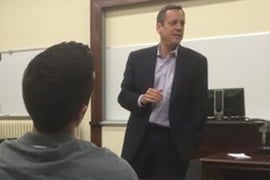This week the University of Pittsburgh launched its new student accelerator dubbed The Blast Furnace (a tip of the hat to Pittsburgh’s steel making history) of which I am its director. A blast furnace, according to that great oracle of all knowledge(!), Wikipedia, is a “type of metallurgical furnace used for smelting to produce industrial metals, generally iron, but also others such as lead or copper. Smelting is a form of extractive metallurgy; its main use is to produce a base metal from its ore.”
Pitt’s Blast Furnace is what is known as a seed accelerator, which is a fixed-term, cohort-based program that includes mentorship and educational components and culminates in a public pitch event or “demo day.” It’s designed for any University of Pittsburgh student who wants to start a business. And like a real blast furnace, we extract the best of their efforts as they take their ideas to a business reality. Although as students they are primarily on an educational journey, they are also on several other: first, to find out how their offering can solve their customers’ “pains” or satisfy their “gains”; and second, to network and obtain mentoring from those who can help them on their journey.

As a part of this launch, we brought in two speakers who are long-time Pittsburgh serial entrepreneurs and success stories: Randy Eager and Andy Hannah.
Randy has almost 30 years of successful start-up, product commercialization, and management experience in a wide range of companies and industries. He led several startups, including ATRP & DesignAdvance; worked as an EIR at Pittsburgh InnovationWorks; was a licensing officer at Carnegie Mellon University; and was an executive at BASF.
Andy Hannah, also a serial entrepreneur, is the CEO of Othot, and, at Pitt’s Katz School of Business, serves as an Adjunct Professor of Entrepreneurship and Analytics and Entrepreneur-in-Residence. Andy has been an entrepreneur since 1995, a calling that has stayed firmly with him ever since. He has played C-Level roles at four high-tech startups over the past two decades.
What did Randy and Andy share? Here are three key takeaways:
- Don't listen to your father-in-law (or anyone else, for that matter). When Andy decided to join his first startup, his father-in-law took him out to a bar to have a drink and try to “impart some wisdom.” He told Andy he had responsibilities now, a child on the way, a mortgage—simply put, it was time to grow up. Andy told him, and kept insisting, that it was going to be all right. Now, 20 years later, even his father-law would admit that it was all right. Entrepreneurs know the value of rejection, the value of being told no, and the value of being told “it can’t be done.” Andy simply persisted.
- There’s no one right way. Both Randy and Andy learned a lot from each of their experiences in every startup they were involved with, but they both mentioned that each of the companies was unique and presented its own challenges. Randy discussed the differences between DesignAdvance and ATRP, especially when it came to new partners and cofounders; Andy, on the other hand, shared that he was having more fun now with Othot than any previous startup. Message: There’s no one right way. There’s just the right way for you. Great entrepreneurs strike out with revolutionary innovation but also ground themselves in history. They understand what has worked (or not worked) for other entrepreneurs in the past, and are not chained to what has even previously worked for them. They familiarize themselves with all the tools in the toolbox, even the ones they never use.
- It’s never too late to start. Randy spoke of getting into entrepreneurship later in life, at 40. And Andy is starting his newest adventure, now that his daughter is 20 years old. The message: entrepreneurship isn’t just for the youthful; it could very well be a lifetime pursuit. Mick Jagger famously said in his younger days that he would rather be dead than sing “Satisfaction” at 45. Well, now he’s in his 70s and he’s still singing “Satisfaction.” Publicly. Contrary to what F. Scott Fitzgerald wrote in The Last Tycoon (“There are no second acts in American lives.”), there are apparently many second acts for entrepreneurs. And surprisingly, these second acts are increasing among people over 55. There are actually more companies founded by codgers than kids these days!
Both Randy and Andy mentioned that young entrepreneurs should take advantage of programs like the Blast Furnace, which didn't exist for them as they first ventured into the land of startups. That's good advice for entrepreneurs of any age.